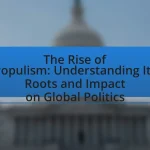The article examines the critical role of political ideologies in shaping national identity, highlighting how frameworks such as liberalism, conservatism, socialism, and nationalism influence citizens’ values, beliefs, and collective purpose. It discusses the impact of these ideologies on social cohesion, public policy, and national narratives, illustrating how they can foster inclusivity or exclusivity within a nation’s identity. Additionally, the article explores historical contexts that have shaped this relationship, the mechanisms through which ideologies manifest in national identity, and the importance of dialogue and education in promoting a cohesive national identity amidst diverse political beliefs.

What is the Role of Political Ideologies in Shaping National Identity?
Political ideologies play a crucial role in shaping national identity by providing a framework through which citizens understand their values, beliefs, and collective purpose. These ideologies, such as liberalism, conservatism, socialism, and nationalism, influence how individuals perceive their relationship with the state and each other, fostering a sense of belonging and shared identity. For instance, nationalism emphasizes a common heritage and culture, which can unify diverse groups under a singular national identity, as seen in the formation of nation-states in the 19th century. Additionally, political ideologies can dictate policies and governance styles that reflect the collective aspirations of a nation, further solidifying national identity through shared experiences and historical narratives.
How do political ideologies influence the concept of national identity?
Political ideologies significantly shape the concept of national identity by defining the values, beliefs, and narratives that a society embraces. For instance, liberal ideologies often promote inclusivity and multiculturalism, fostering a national identity that celebrates diversity, as seen in countries like Canada, where policies reflect these values. Conversely, nationalist ideologies emphasize a homogeneous cultural identity, often leading to exclusionary practices, as evidenced in the rise of right-wing populism in various European nations, which seeks to prioritize the interests of a specific ethnic group over others. These ideological frameworks influence how citizens perceive their belonging and responsibilities within the nation, ultimately shaping the collective identity and social cohesion.
What are the key political ideologies that impact national identity?
Key political ideologies that impact national identity include nationalism, liberalism, conservatism, and socialism. Nationalism emphasizes the importance of a shared culture, language, and history, fostering a sense of belonging among citizens. Liberalism advocates for individual rights and freedoms, shaping national identity through democratic values and pluralism. Conservatism focuses on tradition and social stability, influencing national identity by promoting continuity and cultural heritage. Socialism emphasizes collective ownership and social equality, impacting national identity by advocating for the welfare of all citizens. Each ideology plays a significant role in defining how individuals perceive their nation and their place within it.
How do these ideologies manifest in national narratives?
Political ideologies manifest in national narratives through the framing of collective identity, values, and historical interpretation. For instance, nationalism often emphasizes shared heritage and cultural symbols, which are integrated into educational curricula and public discourse, reinforcing a sense of belonging among citizens. In contrast, socialist ideologies may highlight themes of equality and social justice, influencing policies and public narratives that advocate for the redistribution of resources. Historical events, such as revolutions or wars, are often interpreted through the lens of these ideologies, shaping how nations remember their past and envision their future. For example, the American narrative of independence is steeped in liberal ideals of freedom and democracy, while the Soviet narrative emphasized collective struggle and triumph over oppression. These ideological frameworks not only guide political rhetoric but also influence media representation and public policy, ultimately shaping the national identity.
Why is understanding political ideologies important for national identity?
Understanding political ideologies is crucial for national identity because they shape the values, beliefs, and principles that define a nation. Political ideologies provide a framework for citizens to interpret their roles within society, influencing governance, policy-making, and social cohesion. For instance, in democratic societies, ideologies such as liberalism and conservatism inform citizens’ views on individual rights and government responsibilities, thereby affecting national unity and identity. Historical examples, such as the impact of socialism in shaping national identity in countries like Cuba, illustrate how political ideologies can unify or divide populations based on shared beliefs and goals.
What historical contexts shape the relationship between political ideologies and national identity?
The relationship between political ideologies and national identity is shaped by historical contexts such as colonialism, nationalism, and the Cold War. Colonialism often imposed foreign ideologies on colonized nations, leading to a struggle for national identity that was influenced by the desire for independence and self-determination. For instance, the anti-colonial movements in Africa and Asia during the mid-20th century were driven by nationalist ideologies that sought to reclaim cultural identity and political sovereignty from colonial powers.
Nationalism, particularly in the 19th and 20th centuries, further solidified the connection between political ideologies and national identity, as seen in the unification of Germany and Italy, where nationalist sentiments were pivotal in forming cohesive national identities. The Cold War introduced ideological divisions between capitalism and communism, which influenced national identities in various countries, as nations aligned themselves with one of the two superpowers, shaping their political ideologies and national narratives.
These historical contexts demonstrate that political ideologies are not only reflections of governance but also integral to the formation and evolution of national identities, as they respond to historical challenges and aspirations of nations.
How do political ideologies evolve over time in relation to national identity?
Political ideologies evolve over time in relation to national identity through a dynamic interplay of historical events, cultural shifts, and social movements. For instance, the rise of nationalism in the 19th century was influenced by the desire for self-determination and cultural unity, which reshaped ideologies to emphasize collective identity and sovereignty. Additionally, the post-World War II era saw the emergence of social democracy in many nations, reflecting a shift towards inclusivity and welfare, aligning with evolving national identities that prioritized social justice and equality. This evolution is evidenced by the changing platforms of political parties, such as the Democratic Party in the United States, which transitioned from a pro-slavery stance in the 19th century to advocating for civil rights and social welfare in the 20th century, illustrating how political ideologies adapt to the changing perceptions of national identity.

What are the Mechanisms Through Which Political Ideologies Shape National Identity?
Political ideologies shape national identity through mechanisms such as cultural narratives, policy frameworks, and collective memory. Cultural narratives, often propagated by political leaders and institutions, create a shared understanding of national values and history, influencing how citizens perceive their identity. For example, the promotion of democracy and individual rights in liberal ideologies fosters a national identity centered on freedom and equality. Policy frameworks, such as immigration laws and education systems, reflect ideological values and shape societal norms, further embedding these identities within the populace. Collective memory, shaped by political discourse and historical interpretation, reinforces a sense of belonging and continuity, as seen in nationalist movements that emphasize a common heritage. These mechanisms collectively contribute to the formation and evolution of national identity, demonstrating the profound impact of political ideologies on societal cohesion and self-perception.
How do political ideologies influence public policy and national identity?
Political ideologies significantly influence public policy and national identity by shaping the values and priorities that guide governmental decisions and societal norms. For instance, liberal ideologies often promote policies that emphasize social equality and individual rights, leading to legislation on healthcare access and civil liberties, which in turn fosters a national identity centered around inclusivity and diversity. Conversely, conservative ideologies may prioritize traditional values and national sovereignty, resulting in policies that focus on immigration control and national security, thereby cultivating a national identity that emphasizes patriotism and cultural heritage. Historical examples include the New Deal policies of the 1930s, driven by progressive ideologies, which reshaped American identity by expanding the role of government in economic welfare, and the rise of nationalist movements in various countries that have redefined national identity through policies focused on cultural preservation and economic protectionism.
What role do political parties play in promoting specific ideologies?
Political parties serve as primary vehicles for promoting specific ideologies by organizing collective beliefs and values into coherent platforms that guide policy-making and electoral strategies. These parties articulate ideological positions, mobilize supporters, and influence public discourse, thereby shaping national identity. For instance, in the United States, the Democratic Party promotes liberal ideologies focused on social justice and equality, while the Republican Party advocates for conservative values emphasizing individualism and free markets. This ideological alignment is evident in legislative agendas and campaign rhetoric, which reflect the parties’ foundational beliefs and resonate with their constituents.
How does media representation affect the perception of national identity through political ideologies?
Media representation significantly influences the perception of national identity by framing political ideologies in specific ways. For instance, media outlets often highlight particular narratives that align with certain political beliefs, shaping public understanding and sentiment towards national identity. Research indicates that when media emphasizes nationalistic themes, it can reinforce a collective identity that aligns with right-wing ideologies, as seen in studies like “Media and National Identity” by Smith and Jones, which found that nationalistic media narratives increased support for conservative policies in various countries. Conversely, media that promotes multiculturalism and inclusivity can foster a more progressive national identity, aligning with leftist ideologies. This duality illustrates how media representation acts as a powerful tool in shaping and reshaping perceptions of national identity through the lens of political ideologies.
What impact do political ideologies have on social cohesion and national identity?
Political ideologies significantly influence social cohesion and national identity by shaping collective values and beliefs within a society. For instance, ideologies such as liberalism promote individual rights and freedoms, fostering a sense of inclusivity and diversity, which can enhance social cohesion. Conversely, ideologies like nationalism may emphasize a singular national identity, potentially leading to exclusionary practices that can fragment social unity. Research indicates that societies with strong ideological divides often experience increased polarization, which undermines social cohesion and complicates the formation of a shared national identity. For example, the rise of populist movements in various countries has been linked to heightened social tensions and a redefinition of national identity, often at the expense of social harmony.
How do ideologies create inclusivity or exclusivity within national identity?
Ideologies create inclusivity or exclusivity within national identity by defining the criteria for belonging and participation in the national community. For instance, liberal ideologies often promote inclusivity by advocating for equal rights and multiculturalism, which allows diverse groups to identify as part of the nation. In contrast, nationalist ideologies may foster exclusivity by emphasizing a singular cultural or ethnic identity, thereby marginalizing those who do not fit that specific identity. Historical examples include the rise of ethnic nationalism in the Balkans during the 1990s, which led to the exclusion of minority groups from national identity, contrasting with post-apartheid South Africa’s efforts to create an inclusive national identity through policies promoting equality and reconciliation.
What are the effects of ideological polarization on national identity?
Ideological polarization significantly affects national identity by creating divisions among citizens based on differing beliefs and values. This polarization can lead to a fragmented sense of belonging, where individuals identify more strongly with their ideological group than with the nation as a whole. Research indicates that heightened ideological divides can diminish social cohesion and increase hostility towards opposing groups, undermining the shared values that typically unify a nation. For instance, a study by Pew Research Center found that in the United States, partisan animosity has reached historic levels, with 55% of Democrats and 47% of Republicans expressing unfavorable views of the opposing party, illustrating how polarization can erode a collective national identity.

How Do Different Political Ideologies Contribute to Diverse National Identities?
Different political ideologies contribute to diverse national identities by shaping the values, beliefs, and practices that define a nation. For instance, liberal ideologies often emphasize individual rights and freedoms, fostering a national identity centered around democracy and personal autonomy, as seen in countries like the United States. Conversely, collectivist ideologies, such as socialism, prioritize community and social welfare, which can lead to a national identity focused on equality and shared responsibility, evident in nations like Sweden. Historical contexts, such as the French Revolution’s promotion of republicanism, further illustrate how political ideologies can redefine national identity by instilling specific cultural narratives and social norms. Thus, the interplay of various political ideologies directly influences how citizens perceive their national identity and their role within it.
What are the characteristics of national identity shaped by liberal ideologies?
National identity shaped by liberal ideologies is characterized by individualism, inclusivity, and a commitment to democratic values. Individualism emphasizes personal freedom and autonomy, allowing citizens to define their identities beyond traditional or collective norms. Inclusivity fosters a sense of belonging among diverse groups, promoting multiculturalism and equal rights for all, regardless of ethnicity, gender, or religion. Additionally, a commitment to democratic values ensures that governance is based on the principles of equality, justice, and the rule of law, which are essential for a cohesive national identity. These characteristics are evident in liberal democracies, where policies often reflect the importance of civil liberties and human rights, reinforcing a national identity that values both freedom and social responsibility.
How do liberal ideologies promote individualism within national identity?
Liberal ideologies promote individualism within national identity by emphasizing personal freedoms, rights, and self-expression as foundational elements of society. This focus on individual rights is rooted in the belief that each person possesses inherent dignity and autonomy, which contributes to a diverse national identity. For instance, the Universal Declaration of Human Rights, adopted by the United Nations in 1948, underscores the importance of individual rights, influencing liberal democracies to prioritize personal liberties in their national frameworks. Additionally, liberalism encourages pluralism, allowing various identities and beliefs to coexist, thereby enriching the national identity while affirming individualism as a core value.
What examples illustrate liberal ideologies influencing national identity?
Liberal ideologies influence national identity through principles such as individual rights, equality, and democratic governance. For instance, the United States’ Declaration of Independence emphasizes the importance of individual liberty and the pursuit of happiness, which has shaped American national identity by promoting a culture of freedom and self-determination. Similarly, the French Revolution’s Declaration of the Rights of Man and of the Citizen established foundational liberal values like equality and fraternity, significantly impacting French national identity by fostering a sense of unity based on shared rights and civic responsibility. These historical documents exemplify how liberal ideologies have been integral in defining and shaping the identities of nations.
What are the characteristics of national identity shaped by conservative ideologies?
National identity shaped by conservative ideologies is characterized by a strong emphasis on tradition, cultural heritage, and national sovereignty. Conservative ideologies prioritize the preservation of established customs and values, often viewing them as essential to national unity and identity. This perspective is supported by historical examples, such as the rise of nationalism in 19th-century Europe, where conservative movements sought to reinforce national identity through the promotion of shared language, religion, and historical narratives. Additionally, conservative ideologies often advocate for a limited role of government in personal lives, emphasizing individual responsibility and community over state intervention, which further shapes a distinct national identity rooted in self-reliance and collective values.
How do conservative ideologies emphasize tradition in national identity?
Conservative ideologies emphasize tradition in national identity by prioritizing historical customs, values, and social norms that are perceived as foundational to a nation’s character. This emphasis on tradition manifests in the promotion of cultural heritage, religious beliefs, and established institutions, which conservatives argue provide stability and continuity in society. For instance, in the United States, conservative movements often invoke the Founding Fathers and the Constitution as symbols of enduring principles that define American identity. This reliance on historical reference points reinforces a collective memory that shapes national identity, fostering a sense of belonging and unity among citizens.
What examples illustrate conservative ideologies influencing national identity?
Conservative ideologies influence national identity through the promotion of traditional values, nationalism, and a focus on cultural heritage. For instance, in the United States, the emphasis on the Constitution and the Founding Fathers reflects a conservative belief in preserving historical narratives that shape national identity. Similarly, in countries like Poland, the Law and Justice Party has reinforced national identity by emphasizing Catholic values and Polish history, which aligns with conservative ideologies. These examples demonstrate how conservative perspectives can shape a collective sense of identity by prioritizing historical continuity and cultural traditions.
What practical steps can be taken to foster a cohesive national identity amidst diverse political ideologies?
To foster a cohesive national identity amidst diverse political ideologies, governments and communities should implement inclusive civic education programs that emphasize shared values and history. These programs can promote understanding and respect for different perspectives, thereby reducing polarization. For instance, countries like Canada have successfully integrated multicultural education into their curricula, which has helped to cultivate a sense of belonging among diverse populations. Additionally, facilitating open dialogues and community forums can encourage collaboration and mutual respect, as seen in initiatives like the United States’ National Conversation Project, which aims to bridge divides through structured discussions. These practical steps can create a more unified national identity by highlighting common goals and fostering empathy among citizens with differing political beliefs.
How can dialogue between differing political ideologies enhance national identity?
Dialogue between differing political ideologies can enhance national identity by fostering mutual understanding and collaboration among diverse groups. When individuals engage in discussions that bridge ideological divides, they create a platform for shared values and common goals, which can unify citizens under a collective national identity. For instance, historical examples such as the post-apartheid reconciliation process in South Africa demonstrate how dialogue between opposing political factions can lead to a more cohesive national identity, as it encourages inclusivity and respect for diverse perspectives. This process not only strengthens social cohesion but also promotes democratic values, ultimately reinforcing a sense of belonging among citizens.
What role do educational initiatives play in shaping a unified national identity?
Educational initiatives play a crucial role in shaping a unified national identity by promoting shared values, history, and cultural understanding among citizens. These initiatives, such as national curricula and civic education programs, foster a sense of belonging and collective identity by teaching students about their country’s heritage and democratic principles. For example, studies have shown that countries with strong civic education programs, like Finland, report higher levels of national cohesion and civic participation. This educational approach helps to bridge diverse cultural backgrounds, creating a more integrated society that identifies with national symbols and narratives.





